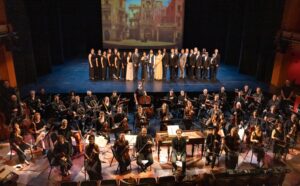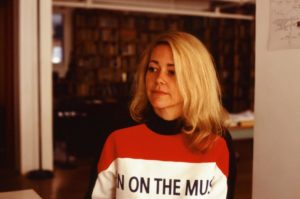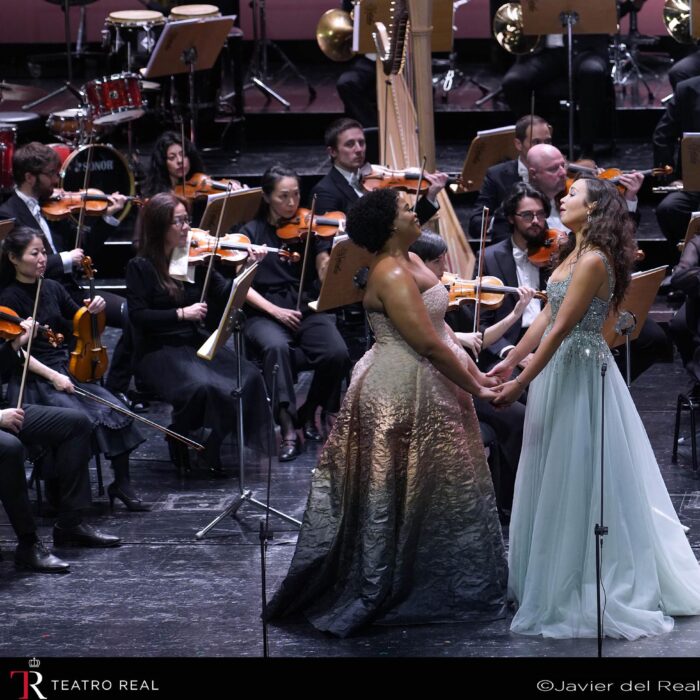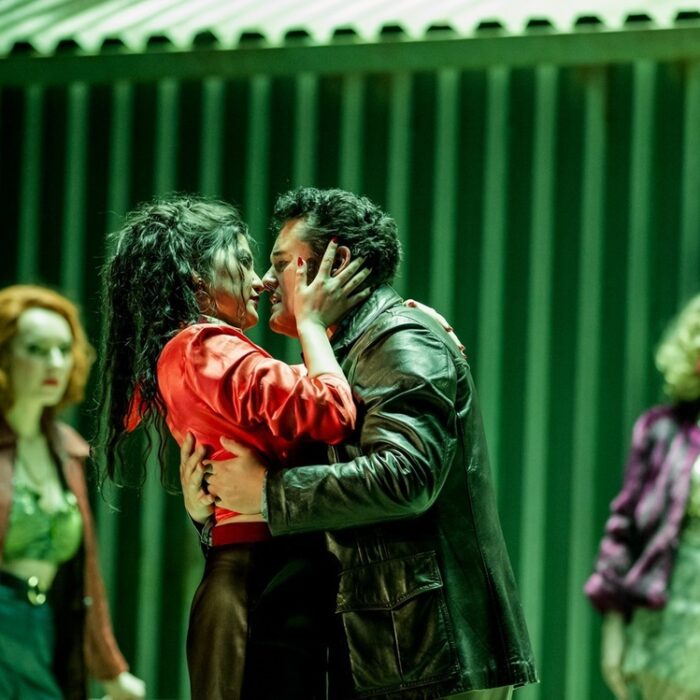
Teatro Nuovo 2023 Review: Crispino e la Comare
By Jennifer PyronPhoto credit: Steve Pisano
Teatro Nuovo is an opera company solely dedicated to the discovery and rediscovery of Italian music specifically from the Bel Canto period. In fact, they are the only opera company in the world dedicated to doing this right now.
And, they are doing it exceedingly well.
The Naples brothers Federico and Luigi Ricci’s “Crispino e la Comare” was performed at Lincoln Center’s Rose Theater on July 20, 2023 by Teatro Nuovo. Prior to the show, I attended the pre-show introduction, hosted by the Artistic and General Director, Will Crutchfield. The entire room was absolutely packed. Within minutes of the door opening to let everyone in, it became standing room only. While I was excited for the discussion to begin, I took a moment to observe my surroundings and really see who all was in the space. Who wants to know more about music from the first half of the 19th century? What exactly has the Early Music movement been doing for decades?
The Ricci Brothers
“If you ask opera-lovers how many Italian comedies they can think of between ‘Don Pasquale’ (1843) and ‘Falstaff’ (1893), most would have to answer ‘none,’” said Crutchfield. “The problem is simply that none of the new composers established a long enough hold on the public to be remembered today. Only Verdi did that, in those years, and Verdi stayed away from opera buffa until the very end,” he said as he made his way to the piano and continued with his discussion.
I thoroughly enjoyed Crutchfield’s pre-show discussion and learned that the Ricci brothers’ “Crispino” is an example of a lesser known work today, but that it actually did quite well in its time. This joint project, composed for Venice in 1850, features librettist Francesco Maria Piave, who had already written librettos for Verdi’s “Ernani” (1844), “I due Foscari” (1844), “Attila” (1846), “Macbeth (first version)” (1847), and “Il corsaro” (1848). It seems that “Crispino” was written from a point in Piave’s career when his star was magically on the rise and in a very big way. Shortly after “Crispino’s” debut in 1850, Piave went on to write Verdi’s “Rigoletto” (1851), “La traviata” (1853), “Simon Boccanegra” (1857), and “La forza del destino” (1862).
The main take-away that resonated with me most was when Crutchfield explained the historical context that made “Crispino’s” synopsis eventually feel old-fashioned decades later. The romantic ideas of “living just to get by” and “in love” eventually lost the attention of its many admirers who were uninterested in indulgent themes around the time of WWI. “The Metropolitan Opera revived ‘Crispino’ in 1919, and the reaction, while basically pleasant, was one of indulgence towards a faded product of grand-parental days and affectionate appreciation for the leading singers (the young Frieda Hempel and the veteran Antonio Scotti led the cast),” said Crutchfield.
From this point, I began to wonder more about what the experience of “Crispino” performed live today teaches us most. I love early music. I also absolutely love “Rigoletto” and “La Traviata.” And so, I knew I was coming from the right place to enjoy “Crispino.” Opera reveals the historical context of a time. But, and most importantly, art has the power to nurture a vulnerable vein of beauty that is unmistakably timeless. Teatro Nuovo’s mission to honor opera as art, in this way, is absolutely extraordinary.
History Made in ‘House Style’
Jonathan Brandani, the Artistic Director of Calgary Opera, was the “maestro al cembalo e direttore” for this production. Teatro Nuovo’s “house style” is a fascinating recipe most “Historically Informed Performance” groups cultivate via research and application of new discoveries along the way. This best determines their own careful approach to the manner and style of the musical era for the work in production. However, in addition to its “house style,” it is Teatro Nuovo’s Young Artist Program that makes what it is that they do, the most valuable work of all.
“Crispino’s” main synopsis involves a young, poor cobbler scraping by with his young wife, Annetta, who is a street vendor. Their landlord wants rent and is open to alternate forms of payment, hinting towards Annetta. Just before Crispino, the young cobbler, decides to throw himself down a well, a Fairy Godmother appears. Although Crispino had zero interest in becoming a doctor before this moment, she gives him the ability to tell whether or not a sick patient will die. And, thus unfolds all remaining drama surrounding this young couple and their now skeptical community of both patients and “doctors.”
This obvious synopsis made it easy to navigate “Crispino” without much thought towards what was happening to each character. It is definitely an opera buffa, in this way. The greatest benefit of all is how the young singers are given the space and musical direction they need in this opera to really let their voices and personalities shine. The drama never outweighed the simplicity of the Ricci brothers’ music and the naiveté of emotions that resonate at the core of Bel Canto. All of this to say, I feel like this production and Teatro Nuovo’s revival of Bel Canto in its purest form creates a platform in support of every voice to be heard, appreciated and well-received. Again, prioritizing the most valuable work of all to be done.
History in the Making
Brescia-born bass-baritone Mattia Venni as Crispino was history in the making (which was also true for other cast members as well). Venni’s voice is unmatched in its brilliancy, purity and exactness in detail towards Italian diction. He is an Italian instructor, which makes sense for me to say this, but the way his voice gently delivers the most nuanced parts of the Italian language is history in the making. I have never experienced Italian like how I felt when listening to his voice. I was transported!
I also have to mention his attitude, and I do think this is transparent no matter a singer’s role on stage, is a delight. He exemplified care and honored the presence of every cast member for the entire production. His supportive actions spoke volumes. And he was the lead! I really want to see more of this happening, a lead being a true leader!
Costa-Rican American soprano Teresa Castillo as Annetta also led the way in this production. Castillo’s voice exudes a richness that is beyond star quality. Her magnetic presence was so prevalent that I was taken every time she was on stage. Castillo is a radiating source of abundance as an intelligent musician and naturally gifted talent. Her eyes sparkled as she sang. Her voice filled the entire performance hall with its warm timbre, crystal-clear high notes and luscious middle-range. I expect to see her star continue to rise for many years to come. She is a must!
Bass-baritone Dorian McCall as Fabrizio, the cleverest of all physicians, absolutely delivered in his performance. It is rare to see a singer be so true to themselves in a performance like Dorian did. I looked around at audience members’ faces to see them light up in smiles every time he was on stage. There is an unmatched higher intelligence that he just “gets” and “is” on every level. His quick wit, facial expressions, hand-gestures, and physical posturing were spot on!
He was consistently a natural comic relief that put others at ease and made “Crispino” feel accessible, and not just funny. While learning more about him online, I came across a Q&A that made me melt for this singer even more! If anyone wants to know how to “keep opera relevant” for upcoming generations, one way for sure is by allowing brilliant artists like Dorian to come forward and just be themselves!
Mezzo-soprano Liz Culpepper as the Fairy Godmother has the voice of an angel. Culpepper wore a Cinderella-like dress that illuminated her voice’s beauty and transparency. Her high-notes were grounded in Bel Canto technique so that they glittered and gleamed with ease. I also noted her excellent breath-technique in action throughout her entire performance. Culpepper is in control and in her highest joy when she sings. She never took her focus away from honoring the pureness of Bel Canto and how when done well, it pulls at the universal heart strings of all listeners.
Bass Vincent Graña as Mirabolano, doctor and apothecary, really stood out in a very good way during his performance. His voice and delivery exuded great refinement. His eye contact with Jonathan Brandani, his cast mates and his audience revealed his true delight as a performer. He was genuinely engaged with everyone at every moment. Graña is a joy to experience and audience members applauded in response to this fact as well.
Tenor Toby Bradford as a young Tuscan aristocrat sang with an appropriately egotistical air for his character. His voice is gentle in its sound, but very impressive in its breath support. He held onto notes til the very end and the audience loved his delightful playfulness. Baritone Scott Hetz Clark, tenor Jeremy Luis Lopez, mezzo-soprano Abigail Lysinger and the entire chorus also gave phenomenal performances. Every singer at every moment gave an impression of gratitude for the opportunity to perform in Teatro Nuovo’s production.
Honoring Opera of Old
The Bel Canto orchestra gave an extraordinary performance, too. It was incredibly special to hear the period instruments in Rose Theater come to life. I closed my eyes to listen best when I could and discovered the instruments breathing with the singers in a profoundly natural way. Jonathan Brandani conducted with grace and pleasure. He honored the music, the singers and the musicians, together, as one. In my opinion, Teatro Nuovo is like a caring and supportive family unit, in a lot of ways. I observed every member interacting with one another in awareness and respect for their role and the music. This seems to me like a very organic core component of their making, and I want to congratulate Will Crutchfield on upholding this level of high quality for others to take notes from. Yes, I learned a lot from your discussion, but I learned the most from your higher level of production. It speaks volumes when an organization can walk the talk!
It is also important to note the projections used for this production were original designs by Adam Thompson based on sets by Pieretto Bianco for the 191 Met Opera production of “Crispino.” They fit the style and purpose of every moment, as projections very rarely do these days. The projections’ tone, stylized text font, and vignette frames were perfect.
The audience applauded for several curtain calls afterwards. I hope to experience more operas that take what it is they do to heart in the way that Teatro Nuovo naturally does. I want opera performances to continue to be more accessible in this way. It means more in the long-run for an audience to come away from an opera performance feeling inspired because the singers felt inspired during their performance. It means even less for an audience to come away from an opera performance that exploits over-indulgence and dramatic noise created through egotistical means.
Thank you, Teatro Nuovo, for honoring opera as an art that continues to uplift and transcend. I want to see more of this for our future.



